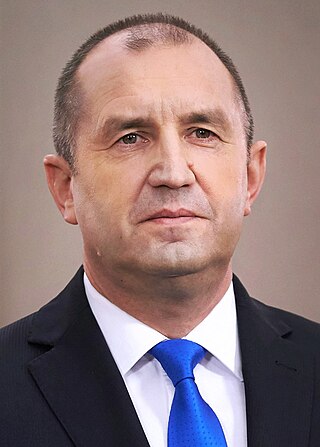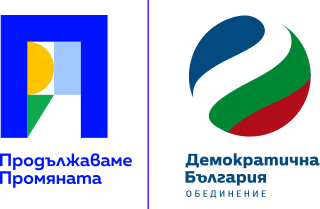Contents
- Incumbents
- Events
- January
- March
- June
- July
- August
- September
- October
- December
- Deaths
- Art and entertainment
- Holidays
- See also
- References
- External links
| |||||
| Decades: | |||||
|---|---|---|---|---|---|
| See also: | |||||
Events in the year 2024 in Bulgaria .
| |||||
| Decades: | |||||
|---|---|---|---|---|---|
| See also: | |||||
Events in the year 2024 in Bulgaria .

The politics of Bulgaria take place in a framework of a parliamentary representative democratic republic, whereby the prime minister is the head of government, and of a multi-party system. Executive power is exercised by the government. Legislative power is vested in both the government and the National Assembly. The Judiciary is independent of the executive and the legislature.

The Movement for Rights and Freedoms is a centrist political party in Bulgaria with a support base among ethnic minority communities. It was a member of the Liberal International and the Alliance of Liberals and Democrats for Europe (ALDE). While representing the interests of Muslims, especially Turks and to a lesser extent Pomaks, the party also receives the largest share of Romani votes.

Sergey Dmitrievich Stanishev is a Bulgarian politician who served Prime Minister of Bulgaria from 2005 to 2009. A member of the Socialist Party, which he led from 2001 to 2014, he later served as Member of the European Parliament from 2014 to 2024. Stanishev was also the President of the European Socialists from 2011 to 2022 and a Member of the National Assembly from 1997 to 2005 and from 2009 to 2014.

European Parliament elections were held in Bulgaria on 20 May 2007. It was the country's first European election, having joined the Union on 1 January of that year. The country still had 18 MEPs, no change from before the election. Until Bulgaria could hold these elections, the country was represented by MEPs appointed by the National Assembly.

GERB, an acronym for Citizens for European Development of Bulgaria, is a conservative populist political party which was the ruling party of Bulgaria during the periods between 2009–2013 and 2014–2021.

On 1 January 2007, Bulgaria and Romania became member states of the European Union (EU) in the fifth wave of EU enlargement.

VMRO – Bulgarian National Movement, commonly known as VMRO, is a national conservative political party in Bulgaria.

Mariya Ivanova Gabriel is a Bulgarian and European politician, president of the Robert Schuman Institute. She served as Deputy Prime Minister of Bulgaria and Minister of Foreign Affairs from 2023 to 2024. A member of the GERB party, she previously served as European Commissioner for Innovation, Research, Culture, Education and Youth from 2019 to 2023, European Commissioner for Digital Economy and Society from 2017 to 2019 and Member of the European Parliament from 2009 to 2017.

Boyko Metodiev Borisov is a Bulgarian politician who served as Prime Minister of Bulgaria on three separate occasions, serving a total of 9 years between 2009 and 2021, making him the country's longest-serving post-communist Prime Minister. A member of the GERB party, which he founded and currently leads, he previously served as Mayor of Sofia from 2005 to 2009. Borisov remains politically active to date and is currently a Member of the National Assembly.

Rumen Georgiev Radev is a Bulgarian politician and former major general who has been the president of Bulgaria since 22 January 2017.

There Is Such a People is a populist political party in Bulgaria established by Bulgarian singer, TV host, and politician Slavi Trifonov. Self-described as a "political product", the party is named after one of Trifonov's own musical albums.

Early parliamentary elections were held in Bulgaria on 2 October 2022 to elect members of the 48th National Assembly. The snap election was called after the fall of the Petkov Government, a four-party coalition, in June 2022. This was the fourth parliamentary election since 2021, an unprecedented situation in Bulgarian history, the previous elections being the April, July, and November 2021 elections.

Kiril Petkov Petkov is a Bulgarian politician, economist, and entrepreneur, who served as Prime Minister of Bulgaria from December 2021 to August 2022. He is the co-leader of We Continue the Change, a political party he co-founded with Asen Vasilev.

Nikolai Denkov Denkov is a Bulgarian politician who served as Prime Minister of Bulgaria from 2023 to 2024. A member of the PP party, he previously served as Member of the National Assembly from 2022 to 2023 and as Minister of Education and Science in 2017 and from 2021 to 2022. Denkov is a physicist, physical chemist and chemist. He is a member of the Bulgarian Academy of Sciences and was a lecturer at the University of Sofia.
Events in the year 2022 in Bulgaria.
Events in the year 2023 in Bulgaria.

Early parliamentary elections were held in Bulgaria on 2 April 2023 to elect members of the National Assembly. These were initially scheduled to be held before November 2026; however, as no government was approved by the 48th Parliament, Bulgarian President Rumen Radev announced in January 2023 that he would call a snap election.

The Bulgarian political crisis is a period of instability in Bulgaria, which has seen the country face seven parliamentary elections over four years: April 2021, July 2021, November 2021, October 2022, April 2023, June 2024 and October 2024.

We Continue the Change – Democratic Bulgaria, also known simply as PP–DB, is a Bulgarian electoral coalition between We Continue the Change and Democratic Bulgaria. The alliance was formed prior to the 2023 election.

The Forty-Ninth National Assembly was a convocation of the National Assembly of Bulgaria, formed according to the results of the early parliamentary elections in Bulgaria, held on 2 April 2023. It was replaced by the 50th National Assembly, summoned by the President on the 17th of June.